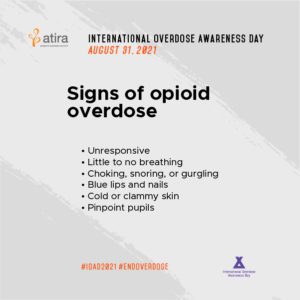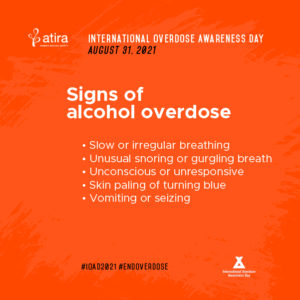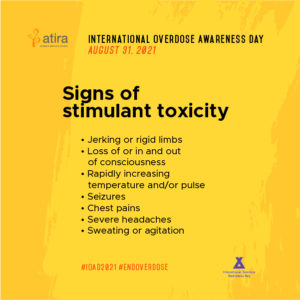Recognize the Signs of Overdose
WHAT IS AN OVERDOSE?
Overdose is a biological response that happens when an overwhelming amount of substances are mixed in the human body. Effects of overdose can occur in people with varying degrees of effect, including slower breathing, unconsciousness and even death.
There are three types of overdoses that can occur through substance use: opioid, stimulants, or alcohol overdose. Opioid overdose refers to an overwhelming amount of substances like heroin, fentanyl, morphine, and oxycodone, whereas stimulant overdosing takes place when too much cocaine, MDMA, or amphetamines like crystal meth enter the system. Alcohol overdose can happen from drinking toxic amounts of wine, beer, liquor, and/or some household products containing alcohol like hand sanitizer and mouthwash.
Other underlying factors can put someone at higher risk of having an overdose, including:
- Injecting substances.
- Taking higher than recommended dosage of prescribed substances.
- Using illicit substances with unverified purity or strength.
- Pre-existing health conditions such as kidney and liver disease or respiratory issues.
- Mixing substances, including sedatives like sleeping pills and muscle relaxants.
WHAT ARE THE DIFFERENT SIGNS OF OVERDOSE?



HOW DO I SUPPORT SOMEONE WHO IS OVERDOSING?
- Stimulate someone by shouting their name. If they’re unresponsive, immediately call 911.
- Turn the person to their side into recovery position to prevent potential choking.
- Clear the airway of the person’s mouth by making sure their it is clear of obstructions, then tilt the head back.
- Stay with the person until help has arrived.
- If available, administer Naloxone immediately.
WHAT ELSE CAN I DO TO SUPPORT OVERDOSE PREVENTION?
- Learn more about overdose prevention and responses in your community.
Vancouver Coastal Health: Overdose Prevention Response
Government of BC: Overdose Prevention Supports
First Nations Health Authority: Overdose Prevention and Harm Reduction
Fraser Health: Overdose Response Regional Supports and Services
Opioid Resource Hub - Learn about how women-centred harm reduction spaces are important.
If you need support, contact us at 604-681-4437 or call our 24/7 call-in support line at 604-880-8881.
